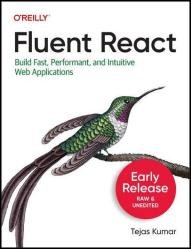Fluent React: Build Fast, Performant, and Intuitive Web Applications (Third Early Release)
- Добавил: literator
- Дата: 22-02-2023, 20:29
- Комментариев: 0
 Название: Fluent React: Build Fast, Performant, and Intuitive Web Applications (Third Early Release)
Название: Fluent React: Build Fast, Performant, and Intuitive Web Applications (Third Early Release)Автор: Tejas Kumar
Издательство: O’Reilly Media, Inc.
Год: 2023-02-21
Язык: английский
Формат: pdf, epub (true), mobi
Размер: 10.1 MB
When it comes to building user interfaces on the web, React enables web developers to unlock a new world of possibilities. This practical book helps you take a deep dive into fundamental concepts of this jаvascript library, including JSX syntax and advanced patterns, the virtual DOM, React reconciliation, and advanced optimization techniques. By becoming fluent in React, you'll quickly learn how to build better web applications.
Author Tejas Kumar helps you explore the depths of React in plain English, without the typical software engineering jargon, so you can more easily understand how this jаvascript library works. You'll learn how to write intuitive React code that fully understands the nuances and layers of React, unlocking a whole new level of fluency.
So, let’s ask this about React. Why is React a thing? The gist of it is that React provides clear and declarative abstractions on existing web and other APIs that make applications behave predictably. That’s it in a nutshell. Let’s understand this a bit more by adding some technical context.
This book assumes we have kind of a satisfactory understanding of this: browsers render HTML that is styled by CSS and made interactive with jаvascript. This has worked great for decades and still does, but building modern web applications with these barebones technologies can be quite unsafe, unpredictable, and inefficient—usually because we enjoy the thrill of getting something working before fine tuning it. And then when it works, we celebrate and forget to fine-tune it. I know I do. Let’s talk about this in a little more detail.
jаvascript gives us access to DOM APIs, where DOM stands for Document Object Model, and API stands for Application Programming Interface. For the uninitiated, the DOM is an in-memory model of a web page’s document structure: it’s a tree of elements that represent the divs on your page, giving you ways to interact with them via jаvascript. The problem is, the DOM on some user of your web app’s device is like an alien planet: we have no way of knowing what browser they’re using, in what network conditions, and on what operating system (OS). The result? Unexpected shit. Moreover, application state becomes quite hard to predict when it updates left and right without some type of state-reconciliation mechanism to keep track of things. Let us consider an example: a setup where we have a list of items, and a user adds a new item to the list. Keeping track of list items and orchestrating additions, removals, and updates before React was quite messy.
You will:
Understand how React works at a deeper level
Write React apps while optimizing them along the way
Build resilient React applications that work well at arbitrary scale
Create React applications for other platforms adjacent to the web and mobile devices
Know when to reach for different mechanisms exposed by React, such as reducers versus state versus refs
Скачать Fluent React (Third Early Release)
Внимание
Уважаемый посетитель, Вы зашли на сайт как незарегистрированный пользователь.
Мы рекомендуем Вам зарегистрироваться либо войти на сайт под своим именем.
Уважаемый посетитель, Вы зашли на сайт как незарегистрированный пользователь.
Мы рекомендуем Вам зарегистрироваться либо войти на сайт под своим именем.
Информация
Посетители, находящиеся в группе Гости, не могут оставлять комментарии к данной публикации.
Посетители, находящиеся в группе Гости, не могут оставлять комментарии к данной публикации.
